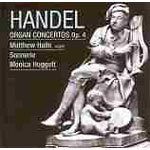
The Six Organ Concertos Op. 4
 $40.00
Out of Stock
$40.00
Out of Stock6+ weeks add to cart
HANDEL
The Six Organ Concertos Op. 4
Matthew Halls (organ) with Sonnerie / Monica Huggett (director)
[ Avie / CD ]
Release Date: Friday 17 June 2005
This item is currently out of stock. It may take 6 or more weeks to obtain from when you place your order as this is a specialist product.
"To sum up: this is an enthralling and wholly convincing recording of Handel's organ concertos opus 4, and gives more than just a hint of the genius Handel was"
(MusicWeb Aug 2005)
"The early 1730s were a difficult stage in Handel's career. There was a growing aversion against Italian opera, and an increasing interest in dramatic works on English text. A rival opera company was founded, which attracted most of the singers who used to sing in Handel's productions. There was also a trait of nationalism in the opposition against Handel, as his German birth was specifically mentioned in negative articles in the press.
As a result Handel's attention increasingly shifted to the composition of English oratorios. In order to attract audiences he introduced a new phenomenon: the organ concerto. It wasn't the first time that he composed an orchestral work with a solo part for the organ. His oratorio 'Il trionfo del Tempo e del Disinganno', which received its first performance in Rome in 1707, begins with a 'Sonata' for oboes and strings with solo organ. Handel started to play organ concertos during the intervals of his oratorio performances in 1735. The attempt to regain his popularity seemed not to be very successful at first. A newspaper wrote that during a revival of his oratorio Esther (first performed in 1718), he "has introduced two Concertos on the Organ that are inimitable. But so strong is the Disgust taken against him, that even this has been far from bringing him crowded Audiences."
Later in 1735 a new organ was made for the Covent Garden Theatre, which was first played by Handel during performances of Deborah. Handel's supporters were deeply impressed, as one wrote that "no entertainment in music could exceed it, except his playing on the organ in Esther, where he performs a part in two concertos, that are the finest things I ever heard in my life."
These early concertos were published by Walsh in 1738 as opus 4. As they had to be playable to a wide circle of musicians, including skilled amateurs, the publication can only give a faint idea what Handel's own performance must have been like. Charles Burney wrote that "he rather chose to trust to his inventive powers, than those of reminiscence: for, giving the band only the skeleton, or ritornels of each movement, he played all the solo parts extempore, while the other instruments left him, ad libitum."
The publication of the organ concertos had great success. One may assume, considering the fact that music was played in many venues, including private homes, small concert halls and taverns, that these concertos were also frequently performed. It is from this perspective that this recording has been made. This means that most concertos are played with one instrument per part, and that the organ is rather small. Its disposition is not the same as that of the organ in the Covent Garden Theatre which Handel used, but has still enough possibilities to allow a differentiation in colours.
The challenge to the soloist is to give at least some idea of what the solo part must have sounded like under Handel's hands, without pretending to emulate his performances. In this recording Matthew Halls gives an impressive interpretation, with much creativity and imagination, both in his ornamentation and the playing of cadenzas. Only in some instances I find that he uses the same ornaments a little too often, for instance when a phrase is repeated. But otherwise I am very happy with this performance. The instrumental ensemble is playing at the same level throughout. The scoring with mostly one instrument per part allows Monica Huggett to add some ornaments of her own. In the Concerto no. 3 the violin parts are doubled. I can't figure out why, since the booklet doesn't give any reasoning for that. The tempi are well-chosen; only the last movement of the 1st Concerto is a little faster than the tempo-indication 'andante' suggests.
To sum up: this is an enthralling and wholly convincing recording of Handel's organ concertos opus 4, and gives more than just a hint of the genius Handel was"
(MusicWeb April 2005)
Tracks:
Concerto in F, op. 4,4 (HWV 292) [14:24]
Concerto in B flat, op. 4,2 (HWV 290) [10:04]
Concerto in G minor, op. 4,3 (HWV 291) [10:34]
Concerto in B flat, op. 4,6 (HWV 294) [12:19]
Concerto in F, op. 4,5 (HWV 293) [08:10]
Concerto in G minor, op. 4,1 (HWV 289)[16:22]